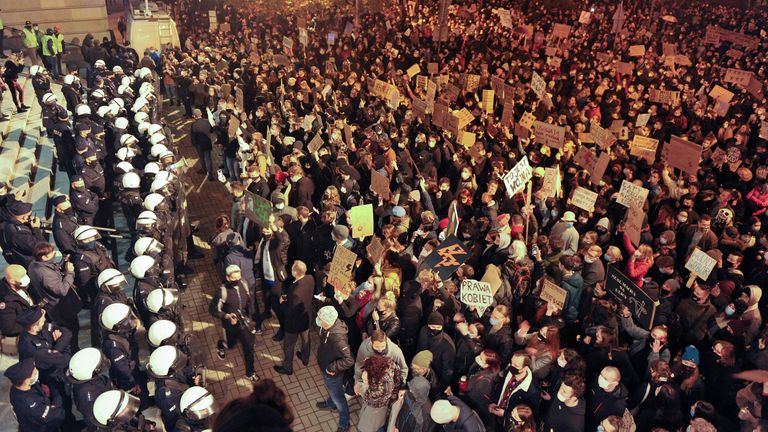Poland’s right-wing government has delayed implementing a high court ruling on further tightening what was already one of Europe’s most restrictive abortion laws, after nationwide protests.
On 22 October, the court decided aborting foetuses with congenital defects violates the constitution – only permitting terminations in cases where there is a risk to the woman’s life or in instances where a crime has taken place – such as rape or incest.
For almost two weeks, hundreds of thousands of people in Poland have defied coronavirus restrictions to take part in huge rallies denouncing the move.
The ruling was scheduled to be formally published on Monday. But with it remaining unpublished, it has no legal power.
A government official said leaders are taking time to debate the contested decision, with the prime minister appealing for talks with protesters and opposition legislators to find a solution.
“There is a discussion going on, and it would be good to take some time for dialogue and for finding a new position in this situation that is difficult and stirs high emotions,” a spokesperson for Mateusz Morawiecki said.
President Andrzej Duda, who is aligned with the government, has proposed a new law that would allow the abortion of foetuses with life-threatening defects, but ban them for disorders such as Down’s syndrome.
The proposal is still seen as too restrictive by some and does not seem likely to win sufficient backing in parliament.
Women’s rights activists are critical of Mr Duda’s idea and Mr Morawiecki’s invitation for talks, and are planning more protests this week.
Experts on constitutional law say delaying publication of the ruling would violate a legal provision that constitutional court rulings be published “without delay”.
“This is by far the worst option,” said Marcin Matczak, a law professor at Warsaw University.
“It boils down to this approach that if someone does not like a ruling by the Constitutional Tribunal, he may not publish it.”
The rulings are published by the government in the Journal of Laws.
Soon after the Law and Justice party won power in 2015 and took steps to control the constitutional court, the government delayed publication of some of the court’s rulings, even by two years, and bowed only when pressured by European Union leaders.


